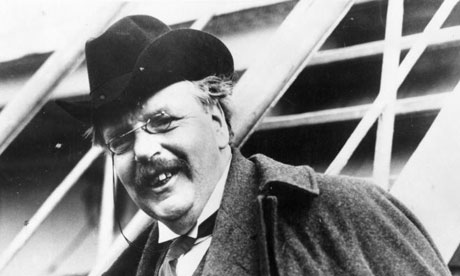 "I would maintain that thanks is the highest form of thought; and that gratitude is happiness doubled by wonder."-GKC, 1917
"I would maintain that thanks is the highest form of thought; and that gratitude is happiness doubled by wonder."-GKC, 1917There are truly refreshing moments in life when we are relieved of the pressure of standing alone with some thought by discovering that it has already been said or thought by another. When I read the above quote, I was so taken up by the joy of this phrase that I wanted to share it with all those present. I felt as if something special, almost sacramental, had occured. And indeed (as you will read), a communion had taken place. Unfortunately, the place I found myself reading this passage was a coffee shop, where such delicate and delicious thoughts lost in the shuffle. Starbucks does us no favors by printing all sorts of maxims on their cups: one becomes deceived that they are all of equal quality (isn't it ironic that, regardless of quality, they all end up in the garbage can).
Anyway, for months now I had found myself trying to say that above quote, but being impaired by not having yet read it. In fact, I had almost taken the extremely treacherous step of trying to write the idea out myself, but was happily prevented from doing so by discovering that I was a century too late. So, instead of a sloppy, second rate version of the above truth, I was taken up with the less tedious task of writing a commentary on it.
And the commentary will be short (though commentary is never as brief as the primary source): Our dependence on God creates as thrill in us that can reach the point of anxiety. Speaking personally, my experience of it often involves a signifigant amount of anxiety. Recently, a close friend of mine rightfully corrected this anxiety by comparing our reception of God's grace to the catching of a frisbee. She stated that, just like a frisbee, grace seems to waver delicately between heaven and earth. She insisted, however, that this should not be a source of fear. We should be confident that, if God tossed us the frisbee, He had ever intention of our catching it. And the intention of the Divine is above suspicion.
Now, she left off the metaphor here, but I will pick it up again by pointing out that I have often dropped a frisbee. She was very right to correct my fear, but the fear was justified. The great feeling of gratitude that comes from participating in Reality is that happiness comes at a risk. That is to say, love comes at a price. There can be no wonder unless the pass can be dropped. There must be some real chance that frisbee will slip through my fingers, otherwise my wonder at catching it will indeed slip through my fingers. But my friend was right: fear is not the right response. Wonder is the right response.
I do not plan here to tackle the topic of Divine Will and human freedom, only to comment that our freedom is indeed Divinely willed. God wants to give us grace (otherwise it could not be gratia, gift) and, in doing so, there must be the real risk that we might not acccept that gift (overwise, it would be said to be forced on us, and not given). What has to happen is a willing to unwill, an active choice to be passive and catch the pass. Some call this surrender. Some call this receptivity. Whatever it is called, it result in thanks, in gratitude, in eucharist. And Eurcharist is the source and summit of life.
When we come to God in this way (that is, in the Eucharist) what we find is that startling fact that He came to Himself in this way. He gave Himself on the cross. For our Salvation did indeed waver between heaven and earth, and when Christ passed on His Spirit, there had to be some real risk that the pass might be dropped. And now my commentary must end, for I have reached the limits of what mere words can express. There is a Divine Silence that surrounds this mystery of Calvary, where even the Word refused to speak. All I can say is that when we have some experience of this love, speaking louder in its silence than all the tongues of man, the very value of Reality seems to double up on itself. We exist most when be understand what it would be to cease to exist. Value pours in from every corner of consciousness. Our happiness is multiplied by wonder, even as drift dying in mid-heaven. The matter of catching the frisbee becomes secondary to the fact that there was a God so loving as to pass it to us in the first place. That we should even be there to catch it becomes the content of our gratitude.



